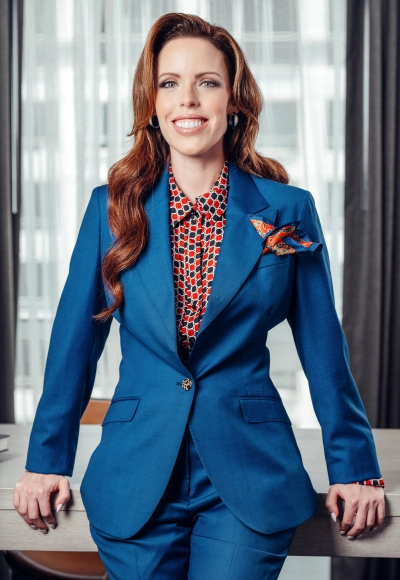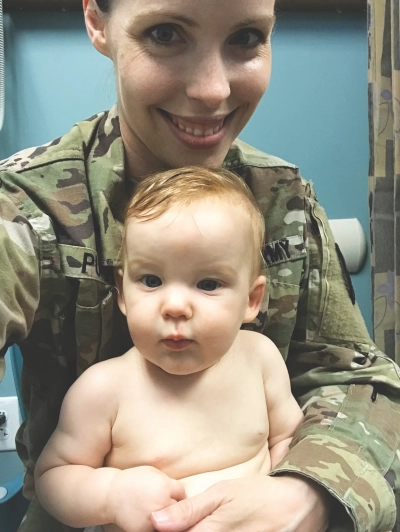ForbesPro
The healthcare industry is on the verge of transformation, accelerated by the pandemic and increasing technological innovation. At the forefront of this evolution is Dr. Laura Purdy, a former Army Physician turned digital healthcare advocate and entrepreneur. In her role as the founder and medical director of the AFD (America’s Favorite Doctor) brand, she is harnessing advanced technology to bring about much־needed change in the healthcare sector.

Dr. Purdy’s initial career trajectory began far from medicine in the world of professional piano performance. “I decided to walk away from music and join a profession such as healthcare mainly because I endured traumatic experiences of bullying, exclusion, and discrimination in my professional engagements. I joined healthcare because I had always respected the profession, and I trusted myself to be able to make the best decisions for patients without the bias of self-interest or allegiance to an institution,” she says.
Military Experience to Civilian Healthcare
Graduating from family medicine residency at Georgia’s Martin Army Hospital, she began 14 years of service as a US Army physician, caring for men and women from all over the country undergoing basic training, airborne school, ranger school, and soldiers on post.
Dr. Purdy believes her military background offers a unique perspective on family medicine, particularly in implementing telehealth services. “The military taught me to balance patient autonomy with adherence to regulations. I’ve tried to bring that ethos to my civilian practice,” she explains.
Upon leaving the military, Dr. Purdy discovered her passion for ensuring equal access to quality healthcare for everyone in America. She immersed herself in the digital healthcare industry, seeing over 20,000 virtual patients as the first full-time telemedicine physician and medical director for MDLIVE.
This led to a key role in bringing virtual treatment to COVID-19 pandemic patients and those in the Ukraine war zone. Now, Dr. Purdy is a sought-after digital medicine expert serving as Medical Director/Co־Founder and advisor for more than 50 leading telehealth providers, including Wisp, OpenLoop, and more.
What challenges have you encountered in practicing medicine in these two environments?
“In the military, we were given a wider berth of autonomy to decide how best to treat patients, as long as we followed our obligations to Army regulations. We could advocate to the commanders when needed and fall back on legal guidelines when required.
Dr. Purdy’s military background offers a unique perspective on family medicine: “The military taught me the power of the free practice of medicine without constriction by overbearing regulations – doing what’s truly best for the patient”
I was shielded from many complexities that civilian physicians face every day. Insurance companies, excessive workloads and bureaucracy were almost non-existent. My primary focus was delivering the best possible care to soldiers and their families. After leaving the military, I found civilian healthcare often bogged down by administrative hurdles and convoluted protocols. It’s a harsh reality that many physicians face, feeling gaslit or criminalized by the system they are part of.
So, in the civilian sector, I am learning so much about regulations, enforcement, patient and physician rights and obligations, and it is a challenging learning curve to navigate. It can also be somewhat frustrating because there is no program to assist physicians who are leaving federal service and entering the civilian sector.”
Challenges and Solutions
When asked about the most significant challenges facing family medicine today, Dr. Purdy pointed out issues like complicated billing, long waits, and inadequate access to healthcare in rural areas.
“Although institutions and systems are designed to empower and support the professional, it seems that modern-day systems serve to overly complicate and create moral dilemmas within physicians, rather than equip them and empower them to solve the problems that are inherent to their profession. New technological approaches offer a wide array of solutions to these problems. Unfortunately, a complicated network of national and state regulations make such tech־based processes difficult to implement, for now.”
Dr. Purdy made the transition to digital healthcare for practical reasons initially – she needed to balance her professional responsibilities with her role as a mother. “Virtual healthcare allows me to be more present for my children and adjust my work hours. It also permits me to help more patients effectively,” she says.
“Digital healthcare will influence the future of all medicine. Just like the banking industry, which now boasts very comfortably־cemented processes that put virtual banking first, I expect healthcare to follow the same trajectory. I believe that healthcare should be initiated at the location of the patient and should be directed in person only at the discretion of the provider. Patients have a right to receive their healthcare when and where they want it, without a burden of responsibility laid upon themselves.”
What kind of impact do you think digital health technology can have on patient care, and how does it benefit the patients in the long run?

“The healthcare industry has been the very last to adopt and integrate virtual technology. This may be because of fear or stagnation of those in power positions who are guiding the industry’s growth and development. I believe it is time for us to re-examine and reassess the ethical principles of medical practice and of the industry as a whole to determine if these historical and potentially archaic ethics still apply.
Digital health technology carries the potential to create a seamless, more affordable, higher-quality care experience for everyone. This is care at the click of a button, right when patients need it most. I believe this kind of technology will do nothing short of revolutionize the way we manage healthcare long-term.
I believe, eventually, digital care will no longer be sub-segmented out from the brick-and־mortar options. AFD is working to build a future state in which virtual options will redefine the way we think of care, ensuring that our patients receive virtuous, ethical care wherever they may be, whatever they may need. I firmly believe digital healthcare is the way toward more equalized access to better, more affordable care and a central way we can improve the lives of practitioners. Right now, I aim to support brands and entrepreneurs who want to fuel this shift, providing operational insight to help them thrive.”
How do you keep the personal touch in digital healthcare?
“Technology is just a tool. The effectiveness of any healthcare system boils down to the rapport between the physician and the patient. In a digital setting, I ensure my patients have the option to choose the kind of interaction they want – be it transactional or more personal. Some patients prefer a more transactional experience, while others seek a deeper connection. We should offer both experiences, respecting patient autonomy.”
She strongly believes that digital healthcare will reshape the future of medicine. “Patients have a right to healthcare when and where they want it. Telehealth not only democratizes healthcare but also eases the burden on practitioners,” she adds.
As a mom of four kids under the age of 10, what advice would you give to women balancing motherhood and a career in medicine?
“Ignore societal expectations. Your best guide in juggling career and motherhood is your intuition. Nobody else is in a position to understand the demands of your professional and personal life as you do. So, respectfully, other people can either support you or they can get all the way out because I could never tell you what is the best way to both have a career and also be a mom. That is for you to decide.”
Israel: The Next Frontier
Dr. Purdy sees Israel as a leader in healthcare innovation and believes that her insights could add value, especially in areas like cash pay and non-governmental healthcare services.
Given your diverse experience in the field of medicine, what unique contributions do you think you could bring to the healthcare system in Israel?
“Israel is a society that has, by far, out-achieved the United States healthcare system. They are leading in innovation, progress, and development. They set a standard and an example for how to leverage and utilize practitioners and technologically progressive systems to make sure that people receive the best access to care, at the best time, in the best place.”
“I believe digital healthcare technology stands to innovate and improve every aspect of healthcare, not only in the US but also in other countries, including Israel. I would love to see a deeper integration of digital healthcare technology in the inpatient sector”
She feels like the Israeli healthcare system could use fresh innovation as it pertains to cash pay, non־governmental, deregulated assistance to receiving care. “At AFD, we strive to avoid a one-size-fits-all approach, but rather to be able to evaluate and assess the problems and struggles of the healthcare system so we can proactively and innovatively develop solutions that address these issues. We challenge the status quo and want to keep a forward־thinking approach, always considering the advancement of the profession and the system as we have come to know and accept it.
I believe digital healthcare technology stands to innovate every aspect of healthcare, not only in the US but also in other countries, such as Israel. I would love to see a deeper integration of digital healthcare technology in the inpatient sector, the long-term care sector, and even in day-to-day life.
I do not want people of any population to wonder who they must reach out to in order to get healthcare. I want their daily routines to leverage digital health technologies in the pursuit of healthcare. We should no longer demand that patients come to us to receive their healthcare, we should bring healthcare to them, minimizing the disruption to their lives. We want patients to have their needs met at the time and place that is best for them”.
ForbesPro is Forbes Israel’s Promotional Content Brand





